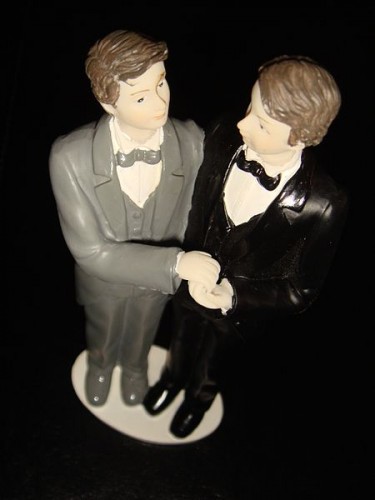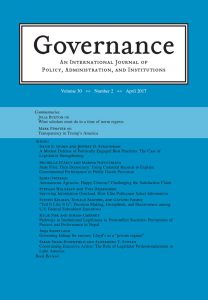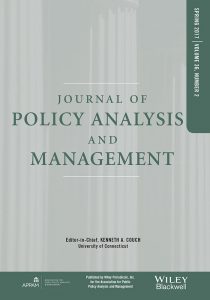Love and Homonormativity: One in the Same?
(Source:http://commons.wikimedia.org/wiki/File:Gay_wedding_a_by_Stefano_Bolognini.JPG)
What is love? Does everyone understand love as how Merriam-Webster’s dictionary defines it? Starting from birth, everyone is taught to love: whether it is a family member, the family pet or a close friend. However, we are never socialized how to love an individual not related by kinship. Amorous love between two individuals is more like a trail and error process. Yet, American society would have one think falling in love is as easy as one, two, three: one only needs to watch a romantic movie. With the recent advancements of Marriage Equality, now extended to thirty-eight states, majority of LGBTQ individuals have adhered to a homonormative ideology. Homonormativity, as defined by Lisa Duggan, is, “…a politics that does not contest dominant heteronormative assumptions and institutions but upholds and sustains them while promising the possibility of a demobilized gay constituency and a privatized, depoliticized gay culture anchored in domesticity and consumption” (Duggan 2002). Is this what LGBTQ rights have resulted in, mimicry of heteronormative ideals that subjugate their everyday experiences? Is there only one specific way to love?
The article Why I Still Have Faith One Day I’ll Say ‘I Do’, written by Damon Gonzalez, is a great depiction of what dating may look like for some gay men. I don’t want to generalize and say for all gay men, or the LGBTQ community at large, because everyone has different experiences with dating and finding love. Yet, for some gay men this is the reality. Gonzalez attests to everything from the support of friends, to sexual endeavors, then to settling down and finding ‘the one.’ However good his points are, what Gonzalez does not realize is his reinforcement, and implicit compliance, with homonormative ideology and societal ideals of love. Gonzalez wants the white American homonormative ideal: the house with the white picket fence, a garage and two kids: his “queer utopia.” Gonzalez may want all of that, but by writing such an article it perpetuates homonormative ideology and discredits all other possibilities of LGBTQ love life. It seems Gonzalez wants to adhere to a homonormative, therefore a more extensively heteronormative, ideology about appropriate love and what is deemed is appropriate.
In the year 2015, mutual monogamy, or marriage, is not the only option, or form of a relationship. However great the victory of Marriage Equality for thirty-eight states, it still places those who do not want to marry, or ‘settle down,’ on the peripheries of society. ‘Soul mates’ and ‘the one’ are social clichés to socialize people to think love between two individuals is the morally, and politically correct thing to do. If a person is single for too long a period of time that person’s social group may start to question their life decisions, or judge them for being single. What’s wrong with going to sleep alone, going/taking yourself out for dinner or doing activities by yourself? If anything, these should be seen as rewarding activities: activities that you do for your mental, physical and emotional health. Love is so engrained into our thoughts and the way we construct our lives for a future that many people forget to take care of their own needs and wants. So when one identifies as LGBTQ, one tries to fit in to the homonormative ideal best as possible. But why perpetuate homonormativity when it’s just an appropriation of heteronormativity?
In Ann Swidler’s text Talk of Love, she focuses on popular culture and how culture, and language, affect people’s notions, expectations and behaviors pertaining to love. Swidler’s text is key in proving love is, also, a social construct: something society teaches us so people can fulfill a function of life. So if all this talk of love just creates norms and ideal situations for society, why conform to homo(hetero)normative ideologies meant to ostracize certain LGBTQ people? There is no longer a need to fit perfectly into a box with a preferred, or perfect, label. Love is not bounded by monogamy. Love is an omnipresent feeling that encompasses all aspects of life. People should not be forced, or led to believe, that mutual monogamy is the end all, and be all. For some people, mutual monogamy works. For others, other forms and variations of love are more suitable. I’m not saying that homonormativity is the devil. Rather, if you choose to subscribe to homonormative ideals as a LGBTQ person, do not disparage those who do not buy the model.
Suggested Readings
- Lisa Duggan. The Twilight of Equality?: Neoliberalism, Cultural Politics, and the Attack on Democracy. Beacon Press (2003).
- Ann Swidler. Talk of Love, University of Chicago Press (2001).





1475-682X/asset/akdkey.jpg?v=1&s=eef6c6a27a6d15977bc8f9cc0c7bc7fbe54a32de)
My essay does not discredit all other possibilities of LGBTQ love life. A “queer utopia” is somthing I wanted as a young gay male but as I grew older moved away from that – not that there is anything wrong with that notion.